The nearest lake and it’s only 4 miles from my house. I run here often. Lake Balboa is in the Sepulveda Dam Recreation area in the San Fernando Valley, a suburb of Los Angeles. I used at Sputnik and Fujichrome RDP III 100.
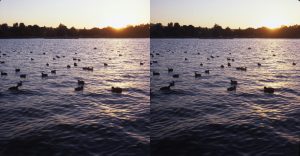
The nearest lake and it’s only 4 miles from my house. I run here often. Lake Balboa is in the Sepulveda Dam Recreation area in the San Fernando Valley, a suburb of Los Angeles. I used at Sputnik and Fujichrome RDP III 100.

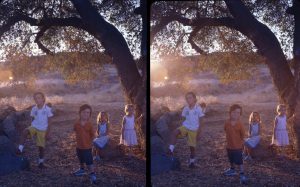 Summer time at Paramount Ranch, Calabasas, CA is a wonderland for my family. We watch the Silents Under the Stars program put on by Hollywood Heritage and the National Park Service. I took this with the World 3D camera and it flarred so I cropped it. Left to right: Kevin is 8, Vincent 4, Emilie 6, and Valentine 5. Shot on Kodak EPR 64 Ektachrome.
Summer time at Paramount Ranch, Calabasas, CA is a wonderland for my family. We watch the Silents Under the Stars program put on by Hollywood Heritage and the National Park Service. I took this with the World 3D camera and it flarred so I cropped it. Left to right: Kevin is 8, Vincent 4, Emilie 6, and Valentine 5. Shot on Kodak EPR 64 Ektachrome.
The Schwedegon Pagoda is considered to be the most sacred Buddhist temple in Myanmar.
Photographed with twin Mamiya C220s using 135mm lenses, I used a tripod. Prove 100F pushed one stop. Probably a 15 second exposure at f22.
This is the Mutianyu section of the Great Wall located 45 miles from Beijing. It is one of the most thoroughly restored segments of the wall.
Photographed with a TL-120 using Provia 100F pushed one stop. No tripod, I get good results with this camera using a waist-level finder and letting it hang around my neck.
This was a New York Stereoscopic Society activity, we all had a great time shooting stereo of kites against the Hudson river and NY skyline.
Photographed with twin Mamiya C220s with 135mm lenses. Prove 100F pushed one stop. I love the surreal quality the telephoto lenses give to this sort of scene.
Bagan is famous for its thousand year old Bhuddist temples. Many of these belonged to wealthy families who built them next to their houses. The houses were made of wood and are long gone, but the temples remain.
Photographed with twin Mamiya C-220s using 135mm lenses, December 2015. Prove 100F pushed one stop. I used a tripod. It was challenging hauling this huge rig around Myanmar and my family got a bit impatient with me at times, but it was worth it to get shots like this one.
All three of these images were captured in Elora, Ontario, Canada at the site of an old mill on the Elora River. I was fascinated by how much was left standing of this structure, although all things considered there was more missing than present! Matt Neima and Steven Lederman, featured in this folio, along with some other friends were out for this photo jaunt. It was a bright day, allowing some significant blue skies mixed with the deteriorating building.
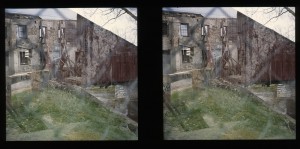 “The Inner Garden” – As per my last run, I am still experimenting with multiple exposures, but this image is the only example I have included this time. It was very bright, so I had to do a bit of calculated guessing at the stacking of the exposure times. I was fascinated by the garden like aspect inside the walls of this building. I also loved the fact I was shooting through a chain length fence. All three images were captured on my Sputnik which I acquired from John Thurston.
“The Inner Garden” – As per my last run, I am still experimenting with multiple exposures, but this image is the only example I have included this time. It was very bright, so I had to do a bit of calculated guessing at the stacking of the exposure times. I was fascinated by the garden like aspect inside the walls of this building. I also loved the fact I was shooting through a chain length fence. All three images were captured on my Sputnik which I acquired from John Thurston.
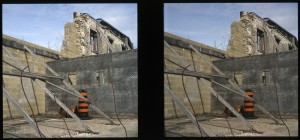 “Under deConstruction” – The strange position of the construction barrel, with the bizarre rebar jutting out of the old foundation caught my eye here. It was also an interesting optical illusion that the supports appear as though they are pushing the crumbling walls over rather than supporting them. The Fuji Provia 100F film did a nice job with the blue sky and drab greys.
“Under deConstruction” – The strange position of the construction barrel, with the bizarre rebar jutting out of the old foundation caught my eye here. It was also an interesting optical illusion that the supports appear as though they are pushing the crumbling walls over rather than supporting them. The Fuji Provia 100F film did a nice job with the blue sky and drab greys.
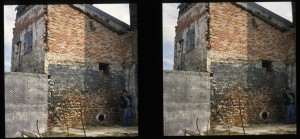 “Stuck in the Corner” – Experimentation is at the core of my shooting. I was intrigued at how much the person in the corner disappeared due to the brightness of parts of the building. My attempt here was to slightly over expose the brightest part of the building, hopefully then under exposing the bottom right area. Maybe it worked…
“Stuck in the Corner” – Experimentation is at the core of my shooting. I was intrigued at how much the person in the corner disappeared due to the brightness of parts of the building. My attempt here was to slightly over expose the brightest part of the building, hopefully then under exposing the bottom right area. Maybe it worked…
Thanks to Steven Lederman for developing this film for me.
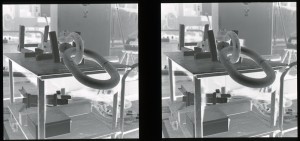 “THE MISSING LINK” – I decided to submit this after being inspired by a negative image of Dorothy Mladenka’s in an earlier Folio loop, or in a different folio (MF3D II?). I actually shot this during work hours. I was hired to shoot an industrial video and decided to bring my TL-120-1 with me. After Principal Photography for the industrial video was completed, I wandered around the factory pretending to take production stills. I originally planned to get this roll developed by dr5 – but for some forgotten reason that didn’t occur. Captured with the aforementioned TL-120-1 on some type of Ilford black and white film. I believe I used a Vivitar 283 fill flash.
“THE MISSING LINK” – I decided to submit this after being inspired by a negative image of Dorothy Mladenka’s in an earlier Folio loop, or in a different folio (MF3D II?). I actually shot this during work hours. I was hired to shoot an industrial video and decided to bring my TL-120-1 with me. After Principal Photography for the industrial video was completed, I wandered around the factory pretending to take production stills. I originally planned to get this roll developed by dr5 – but for some forgotten reason that didn’t occur. Captured with the aforementioned TL-120-1 on some type of Ilford black and white film. I believe I used a Vivitar 283 fill flash.
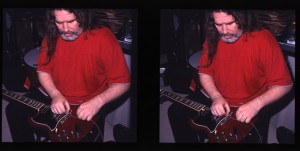 “STRUNG OUT” – one of the plusses of the TL-120-1 is its ability to capture greatly-detailed close-up portraits. This image was captured during a jam session of “The Ass Moles” on December 20, 2008. Despite the fact that we never released a commercially-available recording, we did commission Cal Schenkel (of Frank Zappa record cover art fame) to create a piece of Ass Moles-inspired art for us. TL-120-1 using Fuji Film (Provia?) with a Vivitar 283 flash.
“STRUNG OUT” – one of the plusses of the TL-120-1 is its ability to capture greatly-detailed close-up portraits. This image was captured during a jam session of “The Ass Moles” on December 20, 2008. Despite the fact that we never released a commercially-available recording, we did commission Cal Schenkel (of Frank Zappa record cover art fame) to create a piece of Ass Moles-inspired art for us. TL-120-1 using Fuji Film (Provia?) with a Vivitar 283 flash.
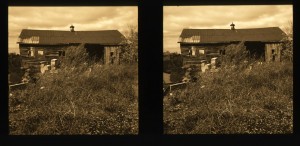 “BARN TO BE WILD” – In 2014 I learned a slew of farms were slated for demolition so that condos could be erected on their land. This is one of the images from the resulting photo excursion that documented some of the doomed farm buildings. This image was captured with a TL-120-55 modified with Sam Smith’s machined lens board, using Scala film and processed in dr5’s DEV 2 (sepia).
“BARN TO BE WILD” – In 2014 I learned a slew of farms were slated for demolition so that condos could be erected on their land. This is one of the images from the resulting photo excursion that documented some of the doomed farm buildings. This image was captured with a TL-120-55 modified with Sam Smith’s machined lens board, using Scala film and processed in dr5’s DEV 2 (sepia).
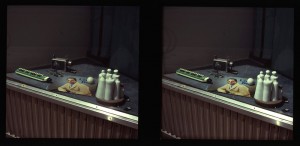 “ESSENTIAL ELEMENTS FOR LIFE” – No need for an explanation. Captured with a TL-120-1 on Fuji 220 film using a modified winding sequence (with the red window gaffer taped shut). Processed with a CPP-2 Jobo unit in my basement bathroom.
“ESSENTIAL ELEMENTS FOR LIFE” – No need for an explanation. Captured with a TL-120-1 on Fuji 220 film using a modified winding sequence (with the red window gaffer taped shut). Processed with a CPP-2 Jobo unit in my basement bathroom.
Matt hasn’t shot alot of film lately, but still wanted to participate in this loop of the folio. Since members of Folio B haven’t seen any of his images, I suggested that I be allowed to pick out four slides from his past body of work for submission to the Folio. He agreed and asked me to curate. My image descriptions will also serve as my comments. Matt usually shoots with Fuji Provia 100F film (not for “Ferry Dock” of course), and a Sputnik. He has also owned two incarnations of the TL-120 – a TL-120-1, and a TL-120-55. As these selections span seven years, I’m not sure which camera or film was used for each one.
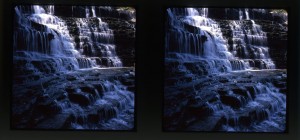 “Albion Falls” – captured in Hamilton, Ontario, Summer 2004 – I selected this shot for its composition, varied lighting, depth and detail. That particular area of Hamilton / Ancaster is home to a great number of waterfalls. Matt has captured a lovely rendering of one of them.
“Albion Falls” – captured in Hamilton, Ontario, Summer 2004 – I selected this shot for its composition, varied lighting, depth and detail. That particular area of Hamilton / Ancaster is home to a great number of waterfalls. Matt has captured a lovely rendering of one of them.
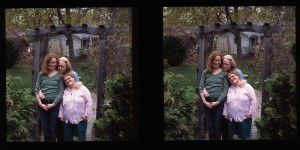 “Pretty Women” – Misha, Sandra and Kim, in Matt’s backyard, 2009 – I selected this image simply because I think it’s a great portrait. You can invent your own back stories for the expressions on the women’s faces. Thought went into the stereo composition – there are foreground elements, the main subjects, and a slightly soft background which serves to highlight the main subjects.
“Pretty Women” – Misha, Sandra and Kim, in Matt’s backyard, 2009 – I selected this image simply because I think it’s a great portrait. You can invent your own back stories for the expressions on the women’s faces. Thought went into the stereo composition – there are foreground elements, the main subjects, and a slightly soft background which serves to highlight the main subjects.
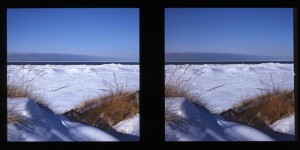 “Lake Huron” – captured in Pinery Provincial Park, 2010 – As you may know, it’s not easily to properly expose snow. Especially when it’s 30 below, ho ho ho. I like the repeating hilly motif from foreground to mid-shore.
“Lake Huron” – captured in Pinery Provincial Park, 2010 – As you may know, it’s not easily to properly expose snow. Especially when it’s 30 below, ho ho ho. I like the repeating hilly motif from foreground to mid-shore.
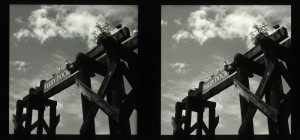 “Self Titled (Ferry Dock)” – captured in Vancouver’s Ferry Market 2011 – I selected this image for the wonderful use of the dr5 process, the composition, subject matter and the sharpness of detail.
“Self Titled (Ferry Dock)” – captured in Vancouver’s Ferry Market 2011 – I selected this image for the wonderful use of the dr5 process, the composition, subject matter and the sharpness of detail.
Matt died of cancer October 1, 2016. His generosity and support for his friends will be missed. [JRT October 3, 2016]
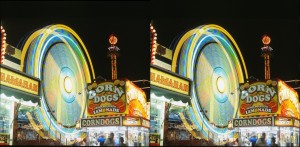
CNE midway
I spent a whole afternoon scouting angles for shooting time exposures at the Canadian National Exhibition midway. After I had shot two rolls of my well planned scenes, I had one frame left over. I quickly looked around for a nice angle and took this image to finish the roll. It was the best one of the lot. I feel quite fortunate that two spotlights on the corn dog stand were burnt out. Either one would have made this shot impossible, or at least very diminished.
TL-120, Provia 100f, f22, four second exposure (I’m pretty sure).
Some of you may get a feeling of deja vu with this one. It is almost identical to a shot I took with my TL-120 a few years back. This time I returned with my Lubitel rig to get a hyper shot of the wonderful and famous Charles Bridge in Prague, which I was just itching to do. The TL-120 image did not show enough depth for me. This one does. I was thinking about putting both images in the folio for comparison, but I would rather show some variety. I prefer this image to the original.
Provia 100f, but I have no idea what the aperture was, but the shutter speed was 1/125th. I never change that, lest I lose my matching shutter speeds.
This image was taken with twin Lubitels again. This time I did not have my tripod or my mounting bar, and I am pretty sure if I did, I would have drawn a little too much attention in the airport terminal. Instead, I recruited my son Preston to look after one camera. We used a window ledge to rest the cameras on about a meter and a half separation and aimed them at a chosen target. Then we did a count down to fire the shutters, with our fingers on the lense’s shutter release. (I didn’t even have cable releases with me. just the cameras, to protect the film inside from the harsh baggage X-ray). We figured the shot was spoiled because both of us managed to turn the camera 45 degrees on the slippery aluminum window frame when we tripped the shutters. To our surprise, they both came out perfect. the shutters must have closed before the cameras slipped. On top of that, the cameras were aimed so well that I could align the chips in my largest mounts.
The plane in the foreground is Poland’s “Air Force one”. We had just watched the plane arrive to a crowd of reporters and photographers gathered on the tarmac to greet the Polish President or Prime Minister or some such, coming to town for some summit talks. They had all cleared out before we could get the cameras set up.
Here is a quiz question. How many aircraft can you see in the image?
We were on our way to a different beautiful historic town when we chanced upon this wonderful view. We stopped by the river bank and I set up my Lubitel rig and shot this hyper (about 16″ separation) using my trusty one-cable-release-in-each-hand synchronization method. As usual, it stopped a bird in flight. Provia 100f and almost certainly sunny 16 on this one.
Thank you so much for welcoming me into your group. I am struck by the great variety present in the folio. There are cha-chas, long night exposures, extreme hyper stereos, multiple exposures, homemade cameras, handheld shots, flash and more. All these different methodologies are used with a vast array of subjects. There is so much to explore with MF3D, and I can’t believe my luck that I’ve stumbled upon it when slide film is still available and this small but dedicated user group exists to support one another in our craft.
Thanks, I’m very grateful!
Claybank, Saskatchewan is home to North America’s best preserved brick making site. The Claybank Brick Plant was operational from 1914 to 1989 and made bricks for many building projects, including the Château Frontenac in Quebec City. The national historic site is open for tours during the summer, but you are able to visit the clay hills any time.
Shortly after receiving my Sputnik, I tried to think of locations near me which would provide good stereo photographic opportunities (a somewhat challenging task on the bald Canadian Prairies!) Claybank occurred to me as a unique place to photograph with its derelict brick-making plant and its eroded hills. I hoped that using black and white film would communicate a kind of neglected feeling about this old place.
All images taken in the Spring of 2016 on PanF+ except for Kilns which was Delta 100.